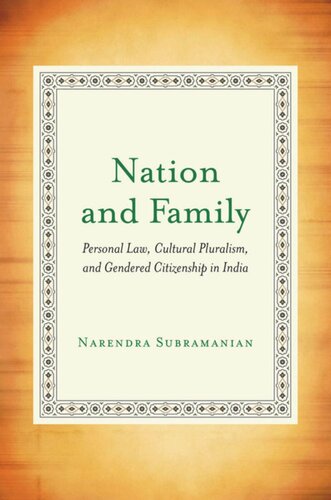

Most ebook files are in PDF format, so you can easily read them using various software such as Foxit Reader or directly on the Google Chrome browser.
Some ebook files are released by publishers in other formats such as .awz, .mobi, .epub, .fb2, etc. You may need to install specific software to read these formats on mobile/PC, such as Calibre.
Please read the tutorial at this link: https://ebookbell.com/faq
We offer FREE conversion to the popular formats you request; however, this may take some time. Therefore, right after payment, please email us, and we will try to provide the service as quickly as possible.
For some exceptional file formats or broken links (if any), please refrain from opening any disputes. Instead, email us first, and we will try to assist within a maximum of 6 hours.
EbookBell Team

4.3
8 reviewsThe distinct personal laws that govern the major religious groups are a major aspect of Indian multiculturalism and secularism, and support specific gendered rights in family life. Nation and Family is the most comprehensive study to date of the public discourses, processes of social mobilization, legislation and case law that formed India's three major personal law systems, which govern Hindus, Muslims, and Christians. It for the first time systematically compares Indian experiences to those in a wide range of other countries that inherited personal laws specific to religious group, sect, or ethnic group. The book shows why India's postcolonial policy-makers changed the personal laws they inherited less than the rulers of Turkey and Tunisia, but far more than those of Algeria, Syria and Lebanon, and increased women's rights for the most part, contrary to the trend in Pakistan, Iran, Sudan and Nigeria since the 1970s.
Subramanian demonstrates that discourses of community and features of state-society relations shape the course of personal law. Ruling elites' discourses about the nation, its cultural groups and its traditions interact with the state-society relations that regimes inherit and the projects of regimes to change their relations with society. These interactions influence the pattern of multiculturalism, the place of religion in public policy and public life, and the forms of regulation of family life. The book shows how the greater engagement of political elites with initiatives among the Hindu majority and the predominant place they gave Hindu motifs in discourses about the nation shaped Indian multiculturalism and secularism, contrary to current understandings. In exploring the significant role of communitarian discourses in shaping state-society relations and public policy, it takes "state-in-society" approaches to comparative politics, political sociology, and legal studies in new directions.